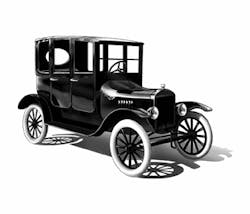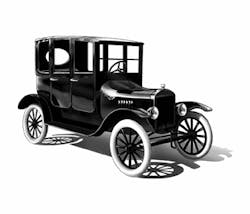Do we still need a boss on the assembly line in dentistry?
3M Dental, winner of the 1997 Malcolm Baldrige National Quality Award, is proud to sponsor the Dental Economics year-long "Quality Management" series.
`Model T` management still drives dental production.
Dr. Bruce Waterman
If there is one indisputable certainty in dentistry, it is change. Ask any dentists if his/her practice has changed in the last 10 years and the anser will be, "Yes."
How we respond to change and create change ultimately determines our future and success. Unfortunately, traditional practice management does not give us the tools to adapt to change or the inherent impetus to create our own positive change. With Total Quality Management (TQM), there exists a management methodology to address this glaring need.
TQM development
Traditional management was developed in the early 1900s with the advent of the Industrial Age. In many factories, especially automobile plants with assembly lines, the workers often were immigrants who did not speak English. Managers were needed to tell them what to do and how to do it.
Management was refined over the years (basically adding more layers), but the basic tenet that management`s role is "bossing" or "telling" has prevailed. I term this traditional approach "Model T Management."
In the late 1940s, the Japanese developed a new management philosophy. Utilizing this new style of management, Japan emerged from a decimated, war-torn country to become the dominant economic power in the world by the late 1970s.
In the 1980s, many industrial American companies - especially those destroyed competitively by the Japanese - began to adopt this new management philosophy. The new style of management then spread beyond manufacturing to service sectors, government, medical fields, education, utilities, military branches - just about every type of business and every Fortune 500 company. These companies and organizations invariably found increased effectiveness and competitive abilities. Many went from floundering and declining entitie, while others were growing and maturing businesses. Even more found growth in profits, as well as increases in quality and customer and employee satisfaction. The quality revolution from this new management philosophy has led to an economic transformation of these businesses and organizations.
What about dentistry?
Unfortunately, dentistry still is operating in the original style of Model T Management developed in the early 1900s. You will not find many dentists utilizing dental materials and methods from 1900, but our management methods are still from that era.
There are several compelling reasons for dentistry to adopt a modern-management philosophy:
1. It`s everywhere! It is hard to argue with the diversity and scope of applications of modern management in America and around the world. It is literally everywhere but dentistry! For instance, the following companies may sound very familiar to you. They were profiled recently in a publication as prime examples of successful applications of the modern-management methodology: Corning, Federal Express, Ritz Carlton, Xerox, Staples, Motorola, GTE, AT&T, Ben & Jerry`s, Intel, NCR, Texas Instruments, Ford, Bose, Carrier, Alcoa, 3 M Dental Products, and Kodak.
2. It works! Multitudes of companies measure their successful applications by increased profits, growth, quality, and satisfaction of customers and employees. Refer back to the list of companies in the previous paragraph. As a consumer, you can see that your spending habits and preferences often validate the effectiveness of the modern management philosophy.
3. Managed care! One glance at what managed care has done to medicine should put fear into all dentists. If fee-for-service dentistry is going to survive, we need modern management to help us justify our fees and improve our services.
TQM and DQM?
TQM originated in Japan largely through the efforts of an American statistician, Dr. W. Edwards Deming. After World War II, Dr. Deming worked with the Japanese to implement his management philosophy, which ultimately transformed the phrase, "Made In Japan." It went from meaning junk to being known as the standard of quality throughout the world.
TQM is a business philosophy that is a customer focused, information-driven management process. Through TQM, the minds and talents of people at all levels are applied, so the organization continually can make improvements to meet customer`s needs. Dr. Deming also used 14 points and seven deadly sins as operational tools. The ultimate goal is to optimize the operating system of your business.
To find a way to adopt TQM to dentistry, it is vital to relate to the basic principles of TQM and translate them specifically to dentistry. I term my adaptation of Deming`s principles of total quality management, Dental Quality Management (DQM). DQM is a denta practice-management philosophy that is a patient-focused, information-driven process. Through it the minds and talents of people at all levels are applied, so the office continually can make improvements to meet patient needs and expectations.
In Model T Management, the patient is not the practice`s focus. Production and the practice become the focus. When decisions are made or problems occur, the doctor/manager must impulsively make a decision because somehow, he/she instinctively knows the answers.
The doctor is supposed to be all-knowing and his/her opinion is the only one that usually counts. When the problem has grown big enough to gain the doctor`s attention, he/she responds in a reactive, micromanagement style.
In DQM, the patient is the focus of most decisions. When problems occur, information is gathered similar to the data collection dentists do to diagnose dental problems. Instead of the doctor having to command and control everything, the entire team is involved in participative management and decision-making.
Team members initiate action to continuously improve the practice, rather than waiting until problems develop and then reacting. Improvements are designed to enhance the patient`s entire experience.
Now, if you were the patient, where would you rather go?
Would you rather go to a practice where the primary focus is on production or where the primary focus is on you, the patient? Would you choose a practice where problems are solved in a reactionary fashion or one in which the emphasis is on continuously improving every aspect of the patient`s experience?
Would you prefer a practice where the doctor, who is usually chairside, is the only one authorized to make decisions or would you prefer a practice where the entire team is empowered to make timely decisions on your behalf?
The answer is obvious.
The principles of total quality management have been proven all over the world. The challenge is for dentistry to move from Model T to Modern Management for a positive change.
To understand DQM, let`s contrast the four basic principles of DQM with the Model T Management methodology of traditional practice management.
DQM Model T Management
___________________________________________________________
Principle 1 Patient-focused Production-focused
Principle 2 Information-driven Impulse-driven
Principle 3 Teamwork- dependent Doctor-dependent
Principle 4 Continuous Micromanagement-directed
improvement-directed

